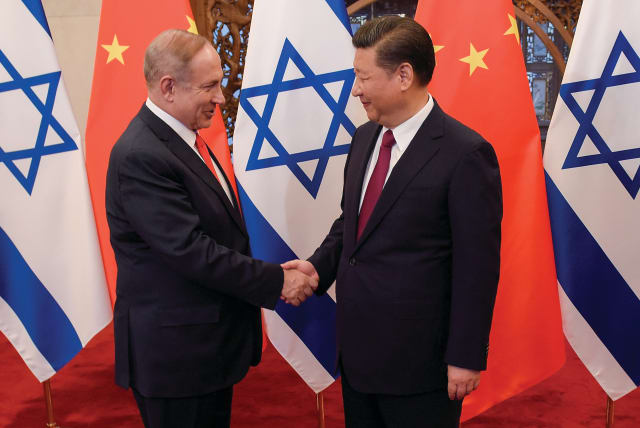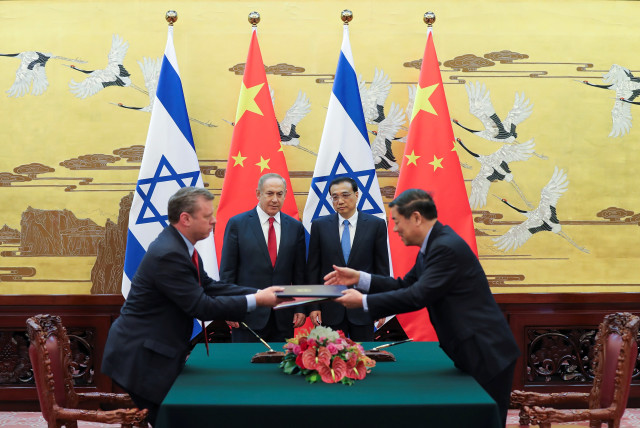Proceed cautiously in relations with China - editorial

As Prime Minister Benjamin Netanyahu prepares to visit China, Israel's Western allies advise to proceed with caution.
Prime Minister Benjamin Netanyahu’s announcement earlier this week that he plans to visit China comes at a crucial moment in global affairs and in engagement with Beijing, following US Secretary of State Antony Blinken’s recent trip to engage with the Chinese government and ease tensions between the two countries.
However, this announcement has also raised concerns due to China’s increasing presence in the Middle East. Consequently, caution should be exercised in the planning of this trip to ensure it does not undermine Israel’s strong alliance with the US.
The relationship between Israel and China has seen ups and downs over the years. The countries established full diplomatic relations and opened reciprocal embassies in 1992, in the halcyon days following the Madrid Conference and leading up to the signing of the Oslo Accords. In 2018, then-Chinese Vice President Wang Qishan became the highest-ranking Chinese official to visit Israel since 2000 when former president Jiang Zemin visited the Jewish state.
However, recent years have witnessed a visible cooling of ties, partly due to the COVID-19 pandemic and the difficulties it posed for high-level visits. Moreover, growing tensions between Israel and the US have played a role in this cooling-off period.
The US and Israel’s Western allies have cautioned against China’s investment in strategic infrastructure, such as the port of Haifa, particularly in light of the growing connections between Israel’s tech and defense industries and the West. Security concerns related to China, exemplified by global controversies surrounding 5G networks and Huawei, cannot be ignored by Western defense companies and industries.
The Middle East and China
Another crucial factor is China’s role in the Middle East. China has been engaging in high-level meetings in the Gulf, signed a 25-year agreement with Iran, hosted Palestinian Authority President Mahmoud Abbas, and even expressed interest in participating in Israel-Palestinian peace discussions. In April, Chinese Foreign Minister Qin Gang spoke with Israeli Foreign Minister Eli Cohen. Given these developments, Israel must approach this situation cautiously.
Israel maintains important partnerships with other Asian countries, such as India and South Korea, in addition to its ties with China. “Visiting China right now will be seen as highly provocative by China hawks in the United States,” said Dr. Jonathan Schanzer, senior vice president for research at the Foundation for Defense of Democracies.
“Admittedly, there will be some who say that Secretary of State Blinken just went, so why not Netanyahu? The difference is that Blinken, even if his mission failed, represented a superpower in an effort to deconflict. The bottom line is that the optics of a visit by an Israeli prime minister will be wielded by China in ways that undermine America. It’s hard to see how this helps Israel,” he said.
Although the Prime Minister’s Office has stated that the trip is not intended as a message to US President Joe Biden, perceptions of the visit will carry significant weight. Netanyahu has always portrayed himself as a historical figure, a leader who leaves his mark on the world stage and establishes Israel as a country with crucial ties in both Asia and the West.
Throughout history, the Zionist movement successfully navigated between global powers, including the German Kaiser, the Ottoman sultan, the Soviet Union, and the US. Israel has a tradition of statesmanship that can handle discussions with China while maintaining a strong alliance with the US and firmly aligning itself with the Western democratic camp.
Just as David Ben-Gurion managed the ship of state during turbulent times, today, amid historic crises and tensions, Israel finds itself in stormy waters once again. Crises often present opportunities, and the Middle East is transitioning to an era of possibilities. The defeat of ISIS, the decline of extremism, and new peace agreements like the Abraham Accords open doors for Israel, and strengthening regional ties with countries in the Eastern Mediterranean, Central Asia, and the Gulf represents new opportunities.
As Netanyahu prepares for his trip to China, he will face close scrutiny. Critics of Israel will perceive this as an opportunity to voice their concerns. The prime minister must, therefore, effectively articulate his global perspective and explain how engaging with Beijing benefits Israel’s relationships and strategic interests.
Jerusalem Post Store
`; document.getElementById("linkPremium").innerHTML = cont; var divWithLink = document.getElementById("premium-link"); if (divWithLink !== null && divWithLink !== 'undefined') { divWithLink.style.border = "solid 1px #cb0f3e"; divWithLink.style.textAlign = "center"; divWithLink.style.marginBottom = "15px"; divWithLink.style.marginTop = "15px"; divWithLink.style.width = "100%"; divWithLink.style.backgroundColor = "#122952"; divWithLink.style.color = "#ffffff"; divWithLink.style.lineHeight = "1.5"; } } (function (v, i) { });

